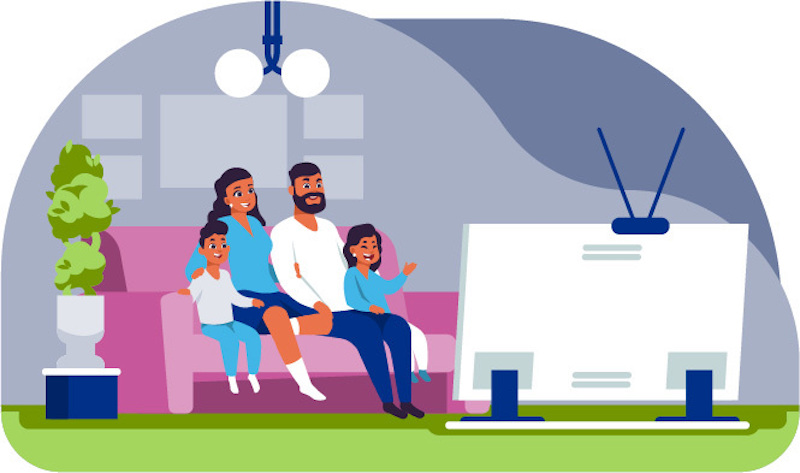Why parents really need to talk to their children about the news

These are strange, anxiety-provoking times. That’s true no matter where one lives or where one sits on the political spectrum — for all of us, it’s upsetting and confusing.
If it feels that way for adults, just imagine what it’s like for children who catch snatches of information and conversations they don’t really understand. That’s why it’s really, really important that parents talk to their children about what is going on in our country and our world. It’s important for two reasons:
Children hear and see more than we think they do
What’s more, they can be easily become upset or frightened from what they hear. We may think that they are oblivious, and perhaps that’s true if they are very small. But unless parents never have the TV or radio news on when children are around, and never discuss current events with anyone when their children are in earshot (and are sure that their children never hear anyone else discuss them), and are 100 percent aware of everything their children see and read on the internet or social media, it’s unlikely that they are oblivious. Without context and reassurance, things that are happening and being said could make children feel downright unsafe.
Children are impressionable
They pay close attention and learn from everything they see and hear. They especially pay attention to the words and actions of their parents and caregivers, and build what they hear and see into their world view — and into the people they become. If we want the world to be a better place for our children, we need to be sure they learn the right things from us.
It’s hard to talk about topics like racism, politics, free speech, or terrorism. They are complicated, nuanced, sometimes scary topics. Talking about them gives parents the heebie-jeebies, almost as much as talking about where babies come from. So just as many parents count on school health class to impart sex ed information, they leave racism and politics to social studies class.
But here’s the thing: Kids need more than facts, because while facts are helpful, they aren’t enough to navigate you through tough decisions and interactions. It takes values, context, and strategies to do that — and it needs to start early.
How to start the conversation
Here are some questions that are worth discussing as a family:
- How do we think about, and act with, people who look, talk, or believe differently than we do? Why does it matter?
- What is racism and racial bias? How do they hurt people?
- What is free speech?
- What kinds of speech and actions hurt people? Are there things we shouldn’t do? Why?
- What are our values as a family? What is most important to us?
- What do we hope for our family, our neighbors, and our country?
- How do we show kindness to others?
- How do we know what is true? Who do we believe? Why?
These are questions that can be adapted to age and situation. They don’t necessarily need to be big, serious, sit-down lectures, either. They can be done in snatches during car rides, at the dinner table, or while walking the dog. They can — and should — be done in response to things heard on the news. A family debrief of the latest news story, done at a level your child can understand, can give the context your child needs as well as a sense of the values that guide your thinking and your actions.
Other ways to support your children
It’s also important to:
- Make sure children know they are safe.
- Listen as much as you talk. Try to understand what your child has heard and what they think about it.
- Be mindful of your child’s media exposure. For younger children, this means limiting their exposure and being a filter. For older children, it means giving guidance about their sources of information.
- Spend time with people who are different from you. So much of racism comes from fear and misunderstanding. Give your child opportunities to meet and interact with people they normally wouldn’t.
- Find ways to serve others, as a family.
- Be willing to take stock of your own fears and biases. Your children will, if they haven’t already.
Some resources that can help:
- Talking to Children about Racial Bias, from the American Academy of Pediatrics
- Terrorism and War: How to Talk to Children, from the American Academy of Child and Adolescent Psychiatry
- Explaining the News to Our Kids, from Common Sense Media
We can stop the polarization, and give our children a better future — one conversation at a time.
Get more answers about Boston Children’s.
Related Posts :
-

Model enables study of age-specific responses to COVID mRNA vaccines in a dish
mRNA vaccines clearly saved lives during the COVID-19 pandemic, but several studies suggest that older people had a somewhat reduced ...
-

Keeping up with the tween skin care trend: What’s in those products?
More teens and tweens are hitting the mall to grab skin-care products they’ve seen on social media — but are ...
-

New insight into the effects of PPIs in children
Proton-pump inhibitors (PPIs) are frequently prescribed to suppress stomach acid in patients with gastroesophageal reflux disease (GERD). Prescribing rates of ...
-

Creating the next generation of mRNA vaccines
During the COVID-19 pandemic, mRNA vaccines came to the rescue, developed in record time and saving lives worldwide. Researchers in ...





